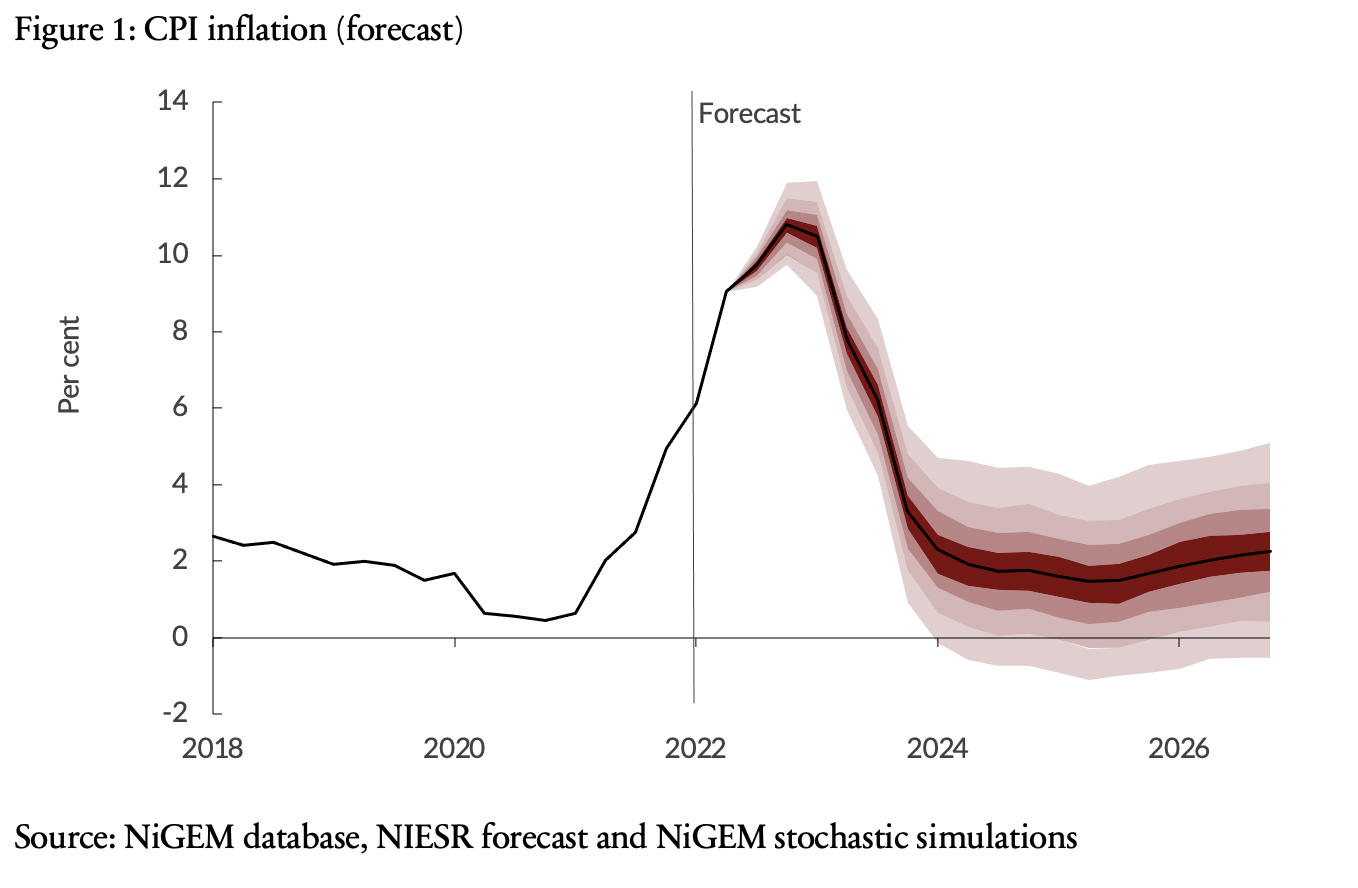 This is a recession created by banks, and there is a real danger that the power banks have over governments, and this government in particular, may mean we never make up the ground we have lost, writes Simon Wren-Lewis.
This is a recession created by banks, and there is a real danger that the power banks have over governments, and this government in particular, may mean we never make up the ground we have lost, writes Simon Wren-Lewis.
What I want to do is look at why we had a recession, and what has happened over the last five years, to see whether that has implications for the type of recovery that we are likely to see. We can think of there being three stages in recovering from a recession. The first is to get the economy growing again. The second stage is to get growth strong enough such that we begin to recover the ground lost during the recession. That means growing at 3% per annum +, not 1% or 2%. We are not yet at stage 2. The third stage is to achieve that above average growth for long enough to regain most of the ground we lost in the recession. Recessions are never a good thing, but we hope they make us poorer for just a few years, maybe even a decade, but not permanently poorer.
In the past UK recessions (early 1980s, 1990s) were created by governments to get inflation down. They put up interest rates, which brought inflation down quite quickly, so they could then reverse the process. We got reasonably quick recoveries that made up much of the ground lost in the recession.

The last recession was different. This was a recession made by banks, not governments. Bank’s vastly over extended themselves, so they collapsed when a relatively modest amount of loans went bad. Forget all the stuff you hear that the recession was due to irresponsible government borrowing – it is just not true. I’ve studied the numbers, and unless you live in Greece, it’s nonsense.
The recession was created by banks, but it was made worse by austerity. In the UK the economy got to stage 1 in 2010, but this was lost when governments in the UK and Eurozone started raising taxes and cutting spending. The independent OBR, the watchdog set up by the current government, estimate UK output has been 1.5% lower each year since 2010 as a result of the austerity imposed by the UK government, and their estimates are definitely on the conservative side. The European Commission calculate that Eurozone GDP in 2013 is 4.5% lower as a result of the austerity that started in 2011, and that has also had a big impact on the UK.
This has implications for the recovery. Kick the economy down with austerity, and our standard economic models tell us it will – after a few years – bounce back. The more austerity, the bigger the bounce. The reason is that those sacked policemen or civil servants eventually get jobs elsewhere and start producing something else. So for that reason alone, once the recovery starts, it could be quite vigorous. Of course this does not mean that austerity was a good idea. Austerity has meant stage 1 has been delayed by 3 years. But in terms of stage 2, it could imply the recovery is stronger when it comes.
But the really important question is stage 3 – making up the ground we lost. And here we need to look at another unusual feature of this recession in the UK: employment has held up much better than output. Now while that might sound good – and it is in the short term – it has a nasty implication. The difference between output and employment is labour productivity, so labour productivity growth has collapsed in this recession. Real wages tend to move with labour productivity, so this is an important reason why living standards have declined so much in the UK.
No one really knows why productivity growth has slowed. That matters because if this slowdown in productivity growth is permanent, then the economy cannot make up much of the ground lost in the recession. We will not get stage 3, and we will all be permanently poorer.
So answering the productivity puzzle is the key to knowing what kind of recovery we will have. My suspicion, shared by others at the Bank of England and elsewhere, is that some of the answer is to be found back where the recession began – with UK banks. Bank lending to firms is important in increasing productivity, because it allows the productive firms to expand (at home and overseas), and the new start-ups to displace the older, less efficient firms. So when bank lending collapsed in the recession, productivity collapsed. If banks start lending again to these new and more productive (but also more risky) firms, we may be able to make up a good deal of that lost ground.
So how are we with fixing the banks? The honest answer is I do not know, but let me end with a concern. Bankers like to pretend they make so much money because they do so much for the economy. There is very little evidence for that. Instead the evidence suggests they make money for two reasons. The first is what economists call rent seeking – essentially making money off other people. When it is illegal, we sometimes get to hear about it, but I suspect mis-selling is endemic.
The second way banks make so much money is by taking risks. When collectively those risks go bad, governments step in to bail them out. They get the reward when the risk pays off, we pick up the tab when it does not. So in effect the public provides a huge subsidy to the banking sector, similar in size to the profits they make, and much of their profits go in bonuses. It would be much better for everyone else if the money paid in bonuses could instead be used to recapitalise banks, so they could start lending again to innovative firms. So it should be good news that the EU is intending to put a very modest cap on bankers’ bonuses. What is the UK government doing? It is taking the EU to court to try and stop this cap.
So this is a recession created by banks, and there is a real danger that the power banks have over governments, and this government in particular, may mean we never make up the ground we have lost.
This blog was originally posted on Simon Wren-Lewis’s Mainly Macro Blog. It is based on opening remarks prepared for the Festival of Economics 2013: The State of Economic Recovery in the UK.
Note: This article gives the views of the author, and not the position of the British Politics and Policy blog, nor of the London School of Economics. Please read our comments policy before posting.
About the Author
 Simon Wren-Lewis is a professor at Oxford University and a Fellow of Merton College. He began his career as an economist in H.M.Treasury. He has published papers on macroeconomics in a wide range of academic journals including the Economic Journal, European Economic Review, and American Economic Review. His current research focuses on the analysis of monetary and fiscal policy in small calibrated macromodels, and on equilibrium exchange rates.
Simon Wren-Lewis is a professor at Oxford University and a Fellow of Merton College. He began his career as an economist in H.M.Treasury. He has published papers on macroeconomics in a wide range of academic journals including the Economic Journal, European Economic Review, and American Economic Review. His current research focuses on the analysis of monetary and fiscal policy in small calibrated macromodels, and on equilibrium exchange rates.








Ok this is the reality. Banks create all but maybe 5% of the money. It is created out of thin air, the thing that gives it its value is YOUR PROMISE to repay the loan. Why does this matter? !
Society as a whole is like the guy who, gets to the end of the month and can’t pay the minimum payment on his credit card. So he borrows money of that card or another card to make the payment. The bank is happy, minimum payment has been made BUT our guy is deeper in debt. As long as the bank is happy to extend his credit all is well. However, we all know in the end the poo will hit the fan.
To get out of trouble our boy has to go to work and eurn some DEBT FREE money to pay down the debt.
We as a society are just like this man, the only way ws can get out of debt is to eurn DEBT FREE money, but because the banks create ALL of the money in the form of a DEBT there is no money there is no DEBT FREE money. Just like our man in the example sooner or latter the banks will stop lending and the world economy will collapse.
The solution is for government to create money out of thin air, which is what the banks do, and pay it to government employees who have already worked for it. This would put Debt Free money into circulation and over time we could pay down our debt. It would also alow government to ensuring that there was
A. Enough money in the system (not too much nore too little)
B. That it was distributed more fairly.
C. There is something called velocity (how quickly money is changing hand) this is an indication of how productive society is. This is directly effected by the distribution which is why distribution is important.
In short expect the shite to hit the fan in the not too distant future.
“No one really knows why productivity growth has slowed. ”
I have a hypothesis.
Because businesses didn’t sack all the people the incorrect economic model said they should. So essentially we had businesses acting like the dole office and keeping people fallow on the books. That’s why productivity looks low. That’s why unemployment didn’t shoot up like it did in the US. And that’s why we have recovered reasonably well.
It will be confirmed should productivity recover, but there is less growth in employment than expected – as all that spare capacity starts to get used again.
And I bet if all that comes to pass, nobody in mainstream economics will alter any of their models of the firm.
The real interesting question is why businesses kept people on the books.
Let them have their bonuses but tie them up in Bank Bonds for 10 years where those bonds are the first port of call for bailouts. Watch them become more responsible when they underwrite their own gambling.